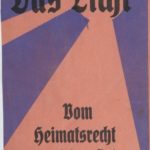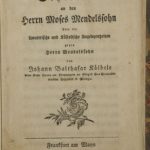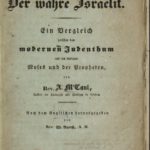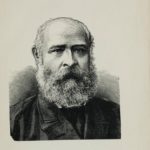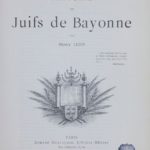Science of Judaism (Wissenschaft des Judentums)
In 2011 the Center for Jewish History and the Leo Baeck Institute, one of its five partners, embarked on a project with Goethe University Frankfurt am Main to digitize nearly 1,000 books that went missing from the university library’s Judaica collection during the devastation of World War II. The goal of the project was to digitally recreate the Freimann Judaica Collection as it existed prior to the war.
The project went from September 2011 through August 2014 and was made possible thanks to a generous joint grant from the National Endowment for the Humanities (NEH) and the Deutsche Forschungsgemeinschaft (DFG/German Research Foundation).
The Judaica Collection of the University Library in Frankfurt am Main was founded at the end of the 19th century with the generous support of Frankfurt Jews. The curator for which it is named, Professor Aron Freimann, looked after the collection from 1898 until 1932 and made it the largest and most significant Judaica collection on the European continent before the Second World War. The collection of approximately 15,000 titles included the major historical literature on the Science of Judaism (Wissenschaft des Judentums). During the 19th-century Wissenschaft movement, Jewish scholars investigated the history and culture of Judaism from a scientific perspective, replacing theological exegesis with the tools of history, archaeology and sociology.
The Frankfurt Freimann collection suffered losses during World War II. The printed collection catalog testifies to the books that once lived in the library. The DFG has been instrumental in funding the collection’s virtual reconstruction through digitization. Prior to the international project, there was a digitization project conducted in a collaboration between the Judaica Collection in Frankfurt and the Technical University in Aachen.
Then the 2011 NEH/DFG-funded project aimed to complete the virtual Freimann collection.
By cross-referencing its own collections with Freimann’s 1932 catalog, LBI discovered that it had copies of the books that are currently missing from the physical collection. Many of these books had been donated to LBI by refugees who brought their own scholarly libraries with them when they escaped Germany in the 1930s. Three other partners of the Center for Jewish History—YIVO Institute for Jewish Research, American Sephardi Federation, and American Jewish Historical Society—also had materials in their collections that were digitized as part of the project.
Thanks to this initiative, scholars are now able to use the Freimann collection—the world’s foremost resource on an influential period of Jewish scholarship—as it existed before 1932. 967 titles–a total of 167,820 images–were made newly available. You can access them through the Center’s Online Public Access Catalog or through the Freimann Portal.

